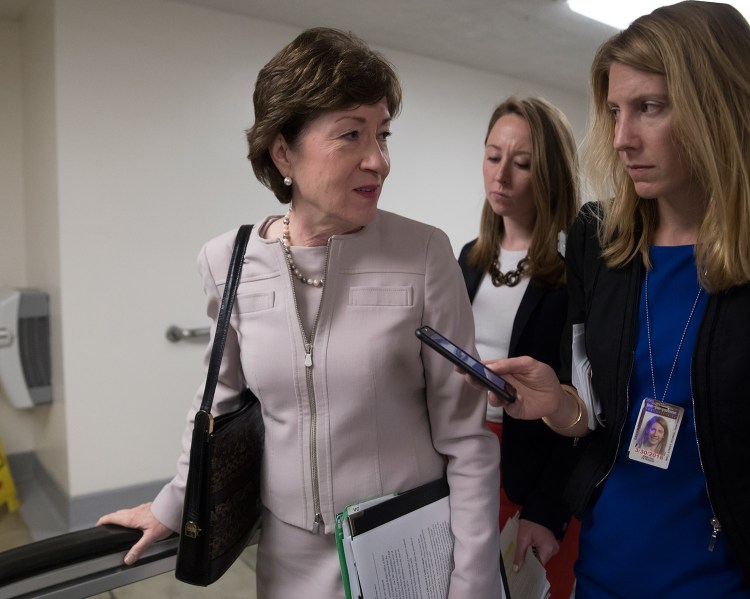Even as the Senate is yet again considering a bill to repeal the Affordable Care Act, Maine Sen. Susan Collins is teaming up with a Florida Democrat in a potential across-the-aisle compromise that aims to shore up the existing ACA insurance markets.
Collins and Sen. Bill Nelson, D-Florida, introduced the Reinsurance Act of 2017 on Tuesday in an attempt to stabilize the health insurance marketplace. Reinsurance are programs designed to reduce risk for insurance companies by providing funds to insurers for high-risk enrollees. When they work, reinsurance programs help keep premiums in check. The bill would provide $2.25 billion per year in federal funding for state-run reinsurance programs.
Collins held out the olive branch in a Senate floor speech Tuesday, beseeching her colleagues for a bipartisan compromise. Her speech came at the same time Republican leadership is heading toward a potential vote to repeal the ACA. Collins was one of three Republican senators to buck the party and vote “no” in a dramatic late night vote on July 27 that seemingly sank efforts to repeal the ACA. Collins, known as a moderate, is one of the few Republicans touting fixes to the health care law as opposed to repealing it.
“I personally remain ever hopeful that a bipartisan agreement on a targeted consensus approach to stabilizing the markets and reducing premiums can still be reached,” Collins said in the floor speech.
Collins has been lobbying for a bipartisan compromise on health care since January. Early this month, the Senate’s Health, Education, Labor and Pensions committee, of which Collins is a member, held hearings on how to fix the ACA, and reinsurance was a solution that Republicans and Democrats agreed on.
“Insurance commissioners from Alaska, Pennsylvania, South Carolina, Tennessee, and Washington state all spoke positively of its benefits as did the five governors who testified before the committee, three Republicans and two Democrats,” Collins said. “They were in broad agreement that reinsurance funding would help to stabilize the markets and lower premiums.”
Collins, while not yet taking an official position on the latest repeal effort, Graham-Cassidy, has expressed strong reservations, and many political experts are counting her in the “no” column.
Appearing on CNN Tuesday, Collins said Graham-Cassidy contains “many of the same flaws of the bill we rejected previously and in fact, it has some additional flaws.”
Collins has said that previous Republican bills to repeal the ACA would have been a “disaster” for the United States.
Graham-Cassidy would remove all subsidies to help moderate and low-income people afford insurance, slash Medicaid, undermine protections for pre-existing conditions and eliminate funding for Planned Parenthood. There would be 32 million fewer Americans with insurance, according to a Washington think tank, the Center on Budget and Policy Priorities.
“I am very concerned by projections cited by the Maine Hospital Association, which show that the bill would cut Medicaid and other federal health care spending in Maine by more than $1 billion in the next 10 years,” Collins said Monday in a statement about Graham-Cassidy,
Collins said that while the Senate is “deeply divided on what to do on health care policy,” politicians should be able to “come together” on a solution to fix the ACA.
Joe Lawlor can be contacted at 791-6376 or at:
jlawlor@pressherald.com
Twitter; @joelawlorph
Send questions/comments to the editors.



